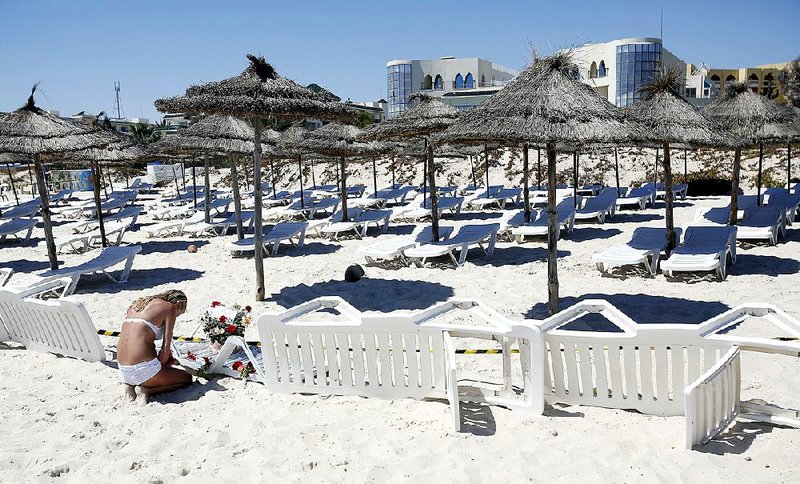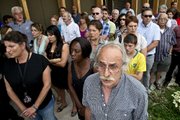TUNIS, Tunisia -- Thousands of tourists fled Saturday from Tunisia after the country's worst terrorist attack killed 38 people -- including 15 Britons -- as the government struggles to prevent future jihadist attacks against its important tourism sector.
New measures to increase the numbers of troops on the streets and crack down on organizations with radical links, however, won't draw the tourists back in the short term, further threatening the fragile economy.
Tunisian authorities identified the attacker who pulled an assault rifle and grenades out of his beach umbrella and opened fire Friday near the coastal city of Sousse as Seifeddine Rezgui, a 24-year-old master's student at Kairouan University.
In addition to the Britons killed, German, Irish, Belgian and Portuguese victims were among the dead. The wounded included 24 Britons, seven Tunisians, three Belgians, and a German, a Russian and a Ukrainian.
Previous reports listed 39 dead. No explanation was given for the revision.
"It's the first time I've ever been on holiday and feared for my life," said British tourist Matthew Preece, adding it was his third time visiting Tunisia and likely his last. "So obviously you can't come back somewhere it's not safe."
European countries and tour operators sent planes to evacuate their citizens. By midday Saturday, nine flights had whisked away 1,400 people, according to Mohammed Walid Ben Ghachem, manager of the Enfidha-Hammamet Airport near Sousse.
At the Imperial Marhaba Hotel, site of part of the attack, the guests had left, according to manager Mohammed Becheur.
"We may have zero clients today, but we will keep our staff," he said, adding there was a 75 percent occupancy rate the day before. "This summer will be hard, but we are very confident for the long term."
Rezgui was originally from Gaafour in Siliana, with no known police record, Tunisian officials said.
The Tunisian government responded to the attack, the second in three months in which a large number of foreign tourists have been killed, with a security crackdown.
Essid announced Saturday a raft of new security measures, but many questioned why they weren't implemented after the attack against tourists in March at the National Bardo Museum that killed 22.
Essid called up the army reserves and said there would now be armed men in the hotels and at tourist sites, and he also promised to crack down on unregulated mosques that preached extremist ideas and close down organizations with shadowy funding and extremist links.
The Friday attack was claimed by the Islamic State, which thousands of Tunisians, disaffected with the lack of opportunity after the 2011 overthrow of secular President Zine El Abidine Ben Ali, have joined.
Extremists have increasingly attacked soldiers and politicians in Tunisia over the past few years, but it was only with the March museum attack that they began targeting the tourism lifeblood of the country.
Tourists and employees were returning home with tales of cowering in rooms or offices as the killer stalked through the hotel.
"He seemed like he did not know how to handle the weapon, because it is heavy," said one witness, Hassen, 30, who declined to give his full name. "He seemed not to be experienced."
Yet the gunman was silent and businesslike, Hassen and other witnesses said Saturday. As the tourists fled and saw friends falling, he pursued the sunbathers from the beach to the pool and eventually to the administration offices on the second floor of the hotel.
The only words he uttered were to tell Tunisians to get away. It was tourists, he made clear, he wanted to kill.
"Something was not right," said Christine Callaghan, a middle-aged woman from Norfolk, England, describing the moment she first heard the gunshots as she lay with her husband by the pool. "It was very long and very loud," she said, from her hospital bed Saturday. "My husband screamed out: 'Quick, run!'"
Callaghan and many of the hotel guests never saw the lone gunman.
But a group of Tunisians, who run paragliding tours on the beach in front of the hotel, saw the gunman and tried to remonstrate with him. Hassen was among them.
After some 30 minutes, the gunman went back to the beach and made a phone call. That was when some of the Tunisians approached him.
"He made a call for about a minute and then threw the phone in the water," Hassen said. The only words he spoke, the Tunisians said, were these: "I am not here for you."
Beheading and a 'selfie'
The attack came the same day that a suicide bomber killed 27 people in a Shiite mosque in Kuwait and a man in France ran his truck into a warehouse and hung his employer's severed head on the gate.
The suspect in the beheading took a "selfie" photo with the victim and sent the image via WhatsApp to a Canadian mobile phone number, French officials said Saturday.
French investigators were working to determine the identity of the recipient of the photo, but weren't able to immediately confirm media reports that it was an unspecified person now in Syria, where the Islamic State has seized territory, the security officials said.
Jean-Christophe de Le Rue, a spokesman for Canada's public safety minister, confirmed Canadian authorities are involved in the case.
The investigation has not turned up a solid link to radical or foreign groups to the attack, which has revived concerns about terrorism in France less than six months after deadly attacks in the Paris area.
The suspect, Yassine Salhi, a truck driver with a history of radical Islamic ties, as well as his sister and wife remained in police custody in the city of Lyon, a day after the truck was crashed into the U.S.-owned Air Products chemicals warehouse, officials said.
No group immediately claimed responsibility in the attack. The severed head appeared to mimic the Islamic State's practice of decapitating prisoners and displaying the heads and came days after the militants urged attacks during the Muslim holy month of Ramadan. French authorities say Salhi had links to radical Salafists in the past.
Paris prosecutor's office spokesman Agnes Thibault-Lecuivre said Salhi began speaking with investigators after first refusing to do so. She said investigators haven't found any foreign connection.
The site of the beheading wasn't yet known to investigators, and the victim had been strangled beforehand, she said.
A fourth person arrested Friday was released without being charged. Under French anti-terrorism laws, Salhi and the women can be held up to four days before either being released or handed preliminary charges and locked up.
Saturday, hundreds of people turned out in the region to honor the slain businessman, Herve Cornara, and denounce the violence. Dozens turned out for a minute of silence in Saint-Quentin-Fallavier, the town southeast of Lyon where Friday's attack took place.
Arrests in Kuwait
In Kuwait, police arrested a number of people, among them a Kuwaiti citizen, suspected of being behind the mosque suicide bombing Friday, the country's Interior Ministry said early today..
The announcement was made just hours after thousands of people took part in a mass funeral procession Saturday for the 27 killed in the country's first terror attack in more than two decades.
The Interior Ministry said in its statement that one of the suspects arrested is a Kuwaiti man who was using his home as hideout for the others. Police said another suspect is a 25-year-old from Kuwait's "bidoon" community, which is largely made up of descendants of desert nomads considered stateless by the government. They have long said the government is depriving them of citizenship and rights.
Police did not say how many suspects have been arrested. The government-linked Al-Jarida newspaper reported that seven suspects had been detained overnight.
Kuwait did not name the bomber nor did it give his nationality. In a statement posted online claiming responsibility for the attack, the Islamic State identified him as Abu Sulaiman al-Muwahhad, an assumed name that does not indicate where he was from.
In the statement, the Islamic State said the mosque was attacked because it sought to spread Shiite thought, which the Sunni jihadists consider apostasy.
Shiites make up about one-third of Kuwait's citizens, and many serve alongside Sunnis in the government and security services.
"It was a shock to everybody," said Meshari Alhomoud, a Sunni engineer in Kuwait City who had attended the funeral Saturday with a Shiite friend. "We know about the events in Iraq and Syria -- they are not far away -- but we felt that we were safe in Kuwait, and the government was in denial that this could happen."
Friday's bombing resembled recent attacks on Shiite mosques in eastern Saudi Arabia that also were claimed by the Islamic State, leading many to believe that the group sought to set off a sectarian war.
But the attack appeared to draw Kuwaitis together. Thousands marched Saturday through Kuwait City, waving Kuwaiti flags and chanting, "Sunnis and Shiites are brothers!"
Information for this article was contributed by Bouazza Ben Bouazza, Paul Schemm, Elaine Ganley, Benjamin Wiacek, Shawn Pogatchnik, Philippe Sotto, Jamey Keaten, Michel Euler and Hussain al-Qatari of The Associated Press; and by Carlotta Gall, Farah Samti, Ben Hubbard and Hwaida Saad of The New York Times.
A Section on 06/28/2015



